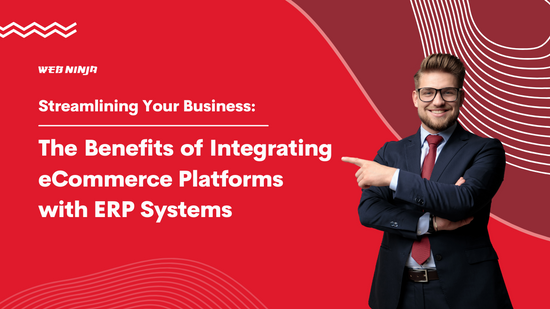The Benefits of Integrating eCommerce Platforms with ERP Systems
Updated on 26 May 2025 | By Jeffrey Almarez | 6-minute read
Running an eCommerce business today isn’t just about selling online—it’s about running smart. Whether you’re a B2B wholesaler juggling multiple warehouses or a fast-growing Shopify store managing thousands of SKUs, integration between your eCommerce platform and ERP system is no longer a luxury—it’s foundational.
In this guide, we’ll break down what ERP integration really involves, why it’s so critical in today’s commerce landscape, and how to get it right for your business. You’ll walk away with practical insight—not jargon—so you can make confident decisions that support sustainable growth.
What Does ERP Actually Do for eCommerce?
An ERP (Enterprise Resource Planning) system acts as your business’s digital nerve centre. It connects key operational areas—accounting, inventory, procurement, logistics, and customer records—into one coordinated system.
In an eCommerce context, ERP systems do the heavy lifting behind the scenes:
- Inventory tracking: Real-time data prevents overselling or disappointing backorders.
- Order processing: Orders move from checkout to fulfilment with minimal manual input.
- Financial synchronisation: Sales, refunds, taxes, and shipping costs flow directly into your accounting system.
- Reporting and forecasting: ERP dashboards give you clarity on profitability, demand patterns, and trends.
Instead of juggling spreadsheets or duplicating data across multiple platforms, everything is centralised. And when your ERP is integrated directly with your eCommerce platform—whether that’s Shopify, BigCommerce, WooCommerce or Amazon—you unlock even more powerful capabilities.
Why Integration Matters More Than Ever
Let’s step into the shoes of a typical eCommerce operator for a moment.
Imagine it’s Monday morning. Over the weekend, your online store processed hundreds of orders. But without integration:
- Staff need to manually export orders from the store and import them into your ERP.
- Stock levels haven’t updated, so what’s in your warehouse no longer matches what’s on your site.
- Refunds and returns must be double-handled between customer service, the warehouse, and finance.
This kind of disconnect is not only inefficient—it puts your reputation at risk. Late shipments, wrong items, and billing errors all eat away at customer trust.
Integrated systems remove these gaps. When your ERP and eCommerce talk to each other, operations become more agile, accurate, and scalable.
The Core Benefits of ERP–eCommerce Integration
Here’s what an integrated setup can offer your business:
1. One Source of Truth for All Data
Integration means inventory, customer info, product data, pricing, and sales records all live in a single ecosystem. This reduces human error, eliminates duplication, and provides a real-time view of performance.
Example: If you run flash sales or limited releases, syncing your ERP ensures stock updates in real time—preventing overselling.
2. Faster Order Fulfilment and Fewer Errors
When an order comes in via Shopify or eBay, your ERP can instantly receive the data, reserve stock, print picking slips, and notify your logistics team—automatically.
This isn’t just about speed. It’s about precision. Manual order processing is prone to mistakes; automation cuts that risk significantly.
3. Better Customer Experience
Customers expect timely deliveries and accurate updates. Integration enables features like:
- Automated shipping notifications
- Real-time stock visibility
- Accurate order status updates
- Faster returns processing
The result? Greater trust and fewer support tickets.
According to a study by PwC, 32% of customers say they would stop doing business with a brand after just one bad experience. Integration helps reduce those chances.
4. Smarter Inventory Management
Your ERP system continuously monitors inventory levels across channels and locations. When integrated, your online storefront reflects these updates in real time—no need to manually reconcile numbers or pause sales.
You also unlock features like:
- Low stock alerts
- Automatic reordering
- Seasonal demand forecasting
Tools like Unleashed or Fishbowl become especially powerful when tied directly into your sales ecosystem.
5. Improved Cash Flow and Financial Oversight
Integration ensures that invoices, purchase orders, refunds, taxes, and discounts are automatically accounted for. This tight financial visibility supports:
- More accurate budgeting
- Streamlined reconciliation
- Easier compliance with local tax regulations (e.g. ATO requirements)
If you’re using ERP software like MYOB AccountRight, Xero, or NetSuite, direct integration with your storefront reduces manual finance tasks dramatically.
6. Scalability Without Rebuilding Processes
Manually managing a dozen orders a day might feel manageable—but growth brings complexity.
ERP integration prepares your business for scale. Whether that’s launching new product lines, opening new warehouses, or expanding to international markets, you’ll have the systems in place to grow without chaos.
Integration Options: Finding the Right Fit
Integration isn’t one-size-fits-all. The best approach depends on your existing systems, budget, and flexibility needs. Here are the main options:
1. Pre-built Connectors
These are out-of-the-box solutions designed to link common platforms—like a Shopify-to-Xero connector.
Pros:
- Fast implementation
- Low technical barrier
- Cost-effective for SMEs
Cons:
- Limited customisation
- May not support complex workflows
Web Ninja offers pre-built connectors for Shopify, eBay, Amazon, and BigCommerce, specifically tailored for Australian businesses using MYOB, Xero, and other accounting tools.
2. Middleware Integration
Middleware acts as a translator between your systems, passing data in both directions.
Pros:
- More flexibility across platforms
- Useful for legacy systems
- Can handle complex data transformations
Cons:
- More complex to set up
- Often requires ongoing IT support
3. API/Web Service Integration
This custom-coded method connects systems directly via APIs (usually using REST or SOAP protocols).
Pros:
- Highly tailored to your business logic
- Seamless and fast
- Supports multi-system environments
Cons:
- Higher upfront cost
- Requires experienced developers
- Ongoing maintenance required
Companies working with large-scale ERP systems like Oracle NetSuite, SAP, or Microsoft Dynamics often go this route.
Real-World Examples: Integration Done Right
Integration isn’t just for industry giants—it’s being adopted by businesses of all sizes to boost efficiency and accuracy.
Amazon
Amazon’s ERP systems link tightly with its marketplace and logistics network. This integration powers same-day shipping, inventory insights, and lightning-fast customer service.
ASOS
With millions of customers globally, ASOS uses ERP integration to keep products, returns, and warehouses in sync—essential for delivering on its “next-day” promise.
Nike
Nike’s direct-to-consumer model leans on ERP integration to streamline product launches, regional distribution, and online retail management across continents.
These examples prove a simple point: success in eCommerce doesn’t come from software alone—it comes from smart, connected systems.
A Practical Takeaway for Australian Businesses
If you're operating in Australia, you’ve likely encountered fragmented platforms—Shopify for your store, MYOB for your finances, and Starshipit for fulfilment. Connecting these using a local integration partner like Web Ninja can centralise your data, reduce admin time, and let you focus on growth.
By using pre-built solutions developed for the Aussie market, you ensure your workflows align with ATO regulations, GST compliance, and local shipping carriers like Australia Post or Toll.
Final Thoughts: Integration Isn’t Just a Tech Upgrade—It’s a Business Strategy
When done right, ERP–eCommerce integration transforms your operation from reactive to proactive. You’ll reduce waste, serve customers faster, and make smarter decisions using real-time data. Most importantly, you’ll future-proof your business for whatever comes next—whether it’s new markets, new channels, or new challenges.
Before diving in, take stock of your current tools and workflows. Talk to your ERP vendor, your developers, or a solution partner like Web Ninja to identify the integration path that fits your needs.
And remember: integration isn’t about complexity—it’s about simplicity on the other side of complexity.
Need Help with Integration?
Web Ninja’s team specialises in connecting eCommerce platforms with leading ERP and accounting systems. From Shopify–MYOB to Amazon–NetSuite, we’ll help you move faster, work smarter, and grow without the tech headaches.
Sources:





